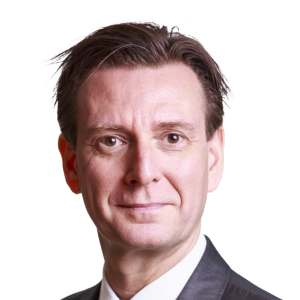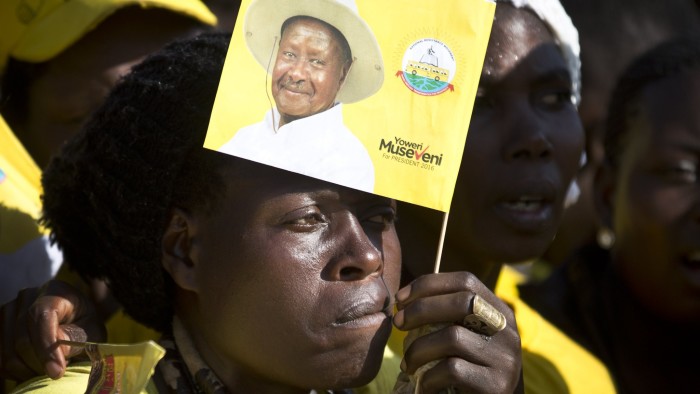Even good leaders should know when to quit


Roula Khalaf, Editor of the FT, selects her favourite stories in this weekly newsletter.
Like many African leaders, Yoweri Museveni preached democracy even as he was seizing power through the barrel of a gun. In his stirring inaugural speech of January 1986, three days after his National Resistance Movement stormed Kampala, Uganda’s new leader spoke eloquently about the cycle of coup and counter-coup despoiling Africa’s political landscape. “We have had one group getting rid of another one, only for it to turn out to be worse than the group it displaced,” he said. “The first point in our programme is the restoration of democracy.”
Thirty years after those rousing words, Mr Museveni is still in charge. Barring a violent upheaval of the sort that propelled him to power all those years ago, he will remain so for at least another five years following deeply flawed elections that culminate at the ballot box on Thursday. After a campaign marred by intimidation, Mr Museveni will be duly returned for a fifth term. He has already amended the constitution once to scrap two-term limits. If he can do so again, this time to end an age limit of 75, then Mr Museveni, already 71, may be able to carry on as leader of Uganda well into his eighties.
That is quite a feat for someone who once said that the problem with Africa was leaders “who want to overstay in power”. Even so, Mr Museveni is not the overstayer-in-chief. That honour goes to Teodoro Obiang Nguema Mbasogo of Equatorial Guinea and José Eduardo dos Santos of Angola, who have both lasted 36 years. Robert Mugabe, who turns 92 this weekend, is not far behind. He will celebrate 36 years as Zimbabwe’s leader in April and has pledged to run again in elections due in 2018. Gambia’s President Yahya Jammeh, who secured power the old-fashioned way in a coup, once told the BBC he was ready to serve for a billion years if Allah willed it. He didn’t mention the will of the people.
The temptation is to see strong leaders — the right ones, of course — as the best solution for weak and troubled states. Nic Cheeseman, an academic and author of Democracy in Africa, says that the prerequisites of democracy are generally taken to be “a coherent national identity, strong and autonomous political institutions, a developed and vibrant civil society, the effective rule of law and a strong and well-performing economy”. If that’s the case, then, sadly, most African countries need not apply.
In Asia, some of the most successful economies, from Taiwan to South Korea and, of course, China, took off during dictatorship, even if some of them eventually became robust democracies. The problem for Africa is that leaders of the calibre of China’s Deng Xiaoping or Singapore’s Lee Kuan Yew have simply not emerged, save perhaps Nelson Mandela.
To be fair to Mr Museveni, his tenure has not been all bad. In his first decade, he presided over a period of political stability after the horrors of Idi Amin. Growth was brisk. Infrastructure was repaired. And Mr Museveni did better than most of his peers — some of whom were shamefully neglectful — in tackling the Aids epidemic head on.
Yet the problem with successful leaders, says Mr Cheeseman, is that “they start to believe their own hype”. While villains and kleptocrats cling on because they fear reprisal, he says, better leaders stay in power because they genuinely believe no one else can do the job. Without their firm hand, they imagine, the state will slip back into penury or chaos. But holding on means hollowing out the institutions on which the future must be built. That is what has happened in Uganda.
The west is often complicit. By the mid-1990s, outright grants accounted for more than half of the Ugandan state’s revenue, up from just 10 per cent when Mr Museveni gained control. One of Africa’s supposedly great success stories was being bankrolled from afar.
History repeats itself. These days Paul Kagame, president of Rwanda since 2000, has replaced Mr Museveni as many donors’ African leader of choice. Though he has lost a little of his lustre, Mr Kagame is credited with ending the 1994 genocide and bringing rapid development. Today, donors account for 30-40 per cent of Rwanda’s operating budget. The price of all that love means turning a blind eye to some of the seamier aspects of the Kagame administration: political assassinations, hollowed-out institutions and a cowed press.
True to type, Mr Kagame has started to see himself as indispensable. After amending the constitution, he is now seeking a third term, a possible prelude to a fourth and fifth. That could see him maintain his hold on power until 2034. If he makes it anything like that long, he will have joined the ranks of the overstayers. By then, his reputation will almost certainly be in tatters.
Comments